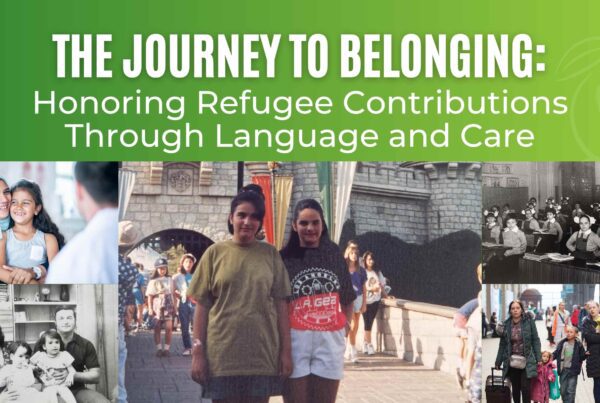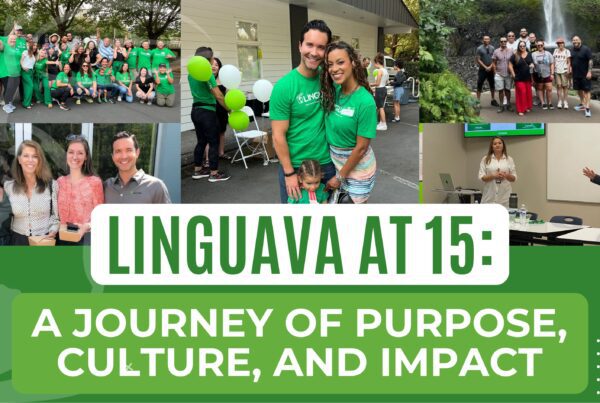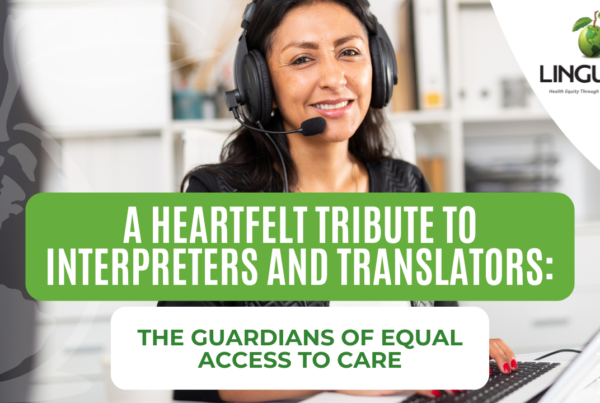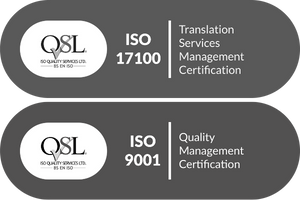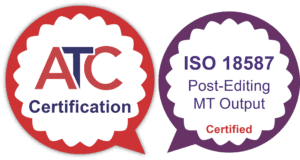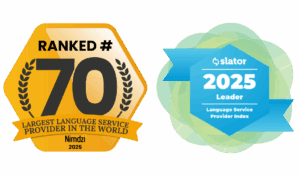By: Stephanie Gabriel, Former Director of Client Experience @ Linguava Interpreters
Last quarter, in our newsletter, we shared a story about a woman who had never been asked to provide her opinion at work in her native language. It brought tears to not only her eyes, but those of her employer, when she told about her experiences and how it made her feel to finally be asked about her experiences. I was thankful to help and to be able to connect people by creating a bridge of communication.
Last week, I was in a bit of a rush, in a time crunch between work and home and needed to quickly pick up a prescription at my local Portland, Oregon pharmacy. I was delighted to see there was only one person ahead of me with the pharmacist, so maybe I could actually get out of there quickly. I distracted myself studying magazines, candy I don’t need, over the counter medicines, and a sanitary napkin display. After waiting in line for what felt like an hour, it occurred to me that the delay was the woman in front of me having some serious issues communicating with the pharmacist. They were both using body language, waving hands, pointing at the medicine instructions, trying to communicate the details about the medicine she was picking up. The pharmacist was talking so loudly, I could hear details about the woman’s health condition and prescription information. Privacy is important and it felt wrong that I would have more information on her private information than she did. I tried not to listen.
I wanted to help, to step in and bridge this communication gap but the hard reality is that I couldn’t speak her language any better than the pharmacist and I am not certain either of us knew the exact language she was speaking. I reached for my phone, looking for resources to help. In a recent email sent to a client, I had a Linguava “Point to your Language” chart at the ready, and the Linguava On-demand Over-the-Phone Interpreting (OPI) call number to get her on the line with an interpreter. I was about to bring this forward, when I realized the pharmacist had gotten her speaker phone out and it sounded like there was a family member or friend on the line, roughly communicating what each person was saying, which is pretty common if it’s the only option. While part of me was relieved for the woman to get some help, another part of me was concerned that she wasn’t getting what she needed, concerned that her private medical information was being conveyed to someone she knew, someone who was clearly not a professional interpreter, bound by HIPAA and trained to convey exactly what is being said by each party.
It got me thinking about conversations I have with clients about their experiences. Language access providers, like Linguava, are providing a service to both clients, providers of medical care, as well as patients, bridging these gaps and helping the end-user, or patient in this case, receive equitable access to information. Language access is much more than what happens in the doctor’s office. It starts with getting information about how to make an appointment, how to get to their location, translating written information like instructions for taking medicine and also how to access language services upon pickup of these medicines.
In this instance, it worked out. It wasn’t ideal, it took longer for both parties and the information may not have been 100% complete, but eventually, the woman was able to pick up her prescription and take it home. When my turn came, the pharmacist looked exhausted. She said this happens several times a week, often enough to be an issue, but not to have an efficient policy in place. I talked with her about what we do at Linguava, making the pharmacist aware of what’s possible with on-demand interpreter services.
One of the reasons I love working in the translation and interpretation field, and with a company that provides language access is the ability to make a positive impact on communities and individuals who need language services for basic needs. I know what Language Access looks like. I see it regularly at hospitals, clinics, and urgent care facilities, onsite working with interpreters and training healthcare staff. I can demonstrate the systematic improvements of inclusivity and equity of access through data and reports. I am inspired by our clients and their patients and the stories behind the far reaching impact of meaningful language access.
While stories of helping folks through providing language access are motivating and touching, stories like this are also a reminder of the work I need to do, to keep going, working towards equitable access to information and services for our Limited English Proficient (LEP) and Deaf and Hard of Hearing (DHH) community members.
If you want to share your experience, please email my team and I at clientexperience@linguava.com. We appreciate your feedback and would love to hear your voice. Feel free to write in your native language if that’s easiest for you.

